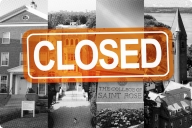You have /5 articles left.
Sign up for a free account or log in.
In response to a town hall question this spring, Vermont senator Bernie Sanders touched off a new debate among Democrats by arguing that people in prison should have the right to vote.
None of Sanders’s rivals for the Democratic presidential nomination have followed him in going as far as endorsing voting rights for people behind bars, which is allowed in only two states.
But while voting rights may be a step too far for many candidates, there's little controversy among most of the Democratic primary field that people behind bars should have access to federal aid for postsecondary education. Nearly all of the top contenders in the Democratic primary have backed repeal of the ban on Pell Grants for incarcerated students, in place since 1994.
Lifting the ban has become a top priority for education advocates and criminal justice reformers. And the widespread support from Democratic presidential candidates shows that for many office seekers, supporting higher education for people behind bars is smart politics -- a sign of how much the party has shifted on criminal justice issues over the past two decades.
Several Democrats seeking the party’s presidential nomination have backed legislation to remove the ban. The campaigns of several others said they would support reinstating Pell Grants for incarcerated students. Among the only primary candidates who haven’t commented on the ban is former vice president Joe Biden, who as a Delaware senator authored the 1994 crime law that included the ban.
Sanders, along with Senate Democrats and presidential hopefuls Elizabeth Warren, Kirsten Gillibrand, Cory Booker, Kamala Harris and Michael Bennett, has signed on to co-sponsor the REAL Act, legislation introduced by Brian Schatz, a Hawaii Democrat, to reinstate Pell Grants for incarcerated students.
Sarah Ford, a Sanders campaign spokeswoman, said the senator voted against an amendment in 1994 that banned federal student aid for those students.
“Bernie believes our nation’s criminal justice system must be reformed and focus on rehabilitation of our citizens, which includes expanding eligibility for Pell Grants to those currently incarcerated,” she said.
Maria Hurtado, a Gillibrand spokeswoman, said the senator believes restoring Pell eligibility “will open up access to higher education and allow people who've been incarcerated to have a chance at a better life postrelease.”
Former Texas representative Beto O’Rourke, another Democrat vying for the presidential nomination, was not among the co-sponsors of House legislation to repeal the Pell ban. But a campaign spokesman said O’Rourke “would support legislation ending the ban on people currently incarcerated from receiving Pell Grants.”
Fellow Texas Democrat Julián Castro, a former Housing and Urban Development secretary and San Antonio mayor, last month released a presidential campaign platform on education that promised support for educational opportunities for incarcerated individuals, including, a campaign spokesman said, repeal of the Pell ban.
And South Bend, Ind., mayor Pete Buttigieg, who pointedly disagreed with Sanders on voting rights for incarcerated individuals, also supports access to federal aid for students behind bars, a campaign spokesman said.
As criminal justice reform is rising in significance, candidates want to establish their bona fides, said Kevin Ring, president of Families Against Mandatory Minimums.
“In that context, support for Pell is relatively easy,” he said. “It’s worthwhile for things not even related to reducing mass incarceration. It’s something everyone should be able to embrace.”
The Biden campaign did not respond to requests for comment. Democratic rivals including Harris, a former prosecutor herself, have criticized Biden for his role in crafting the 1994 crime bill, which was passed at the height of the tough-on-crime era.
Harris has argued the bill fueled mass incarceration in the U.S. Biden has defended the law on the campaign trail, although he has acknowledged some faults, such as the "three strikes" provision that created mandatory life sentences for repeat offenders. But he hasn’t specifically addressed the ban on Pell Grants.
As Mother Jones reported this month, critics warned before the law’s passage about the impact removing student aid would have for the formerly incarcerated. One criminal justice advocate wrote in an op-ed addressed to then president Bill Clinton in 1994 that blocking the grants would mean people would leave prison no better able to cope with life outside than when they entered.
Sanders raised concerns about the crime bill at the time but ultimately voted for it because it included funding for the Violence Against Women Act.
Democrats who voted for an amendment to ban federal aid for incarcerated students have since changed their positions, including Senator Dick Durbin, an Illinois Democrat, and Senator Ron Wyden, an Oregon Democrat. Both have signed on as co-sponsors of Schatz bill to repeal the ban.
“These weren’t all conservative Democrats necessarily who voted for the ban. They were middle-of-the-road Democrats joining Republicans in what was clearly the popular position at the time,” Ring said. “That’s not where the country is anymore.”
The impact of the ban on prison education was consequential. In the academic year before the ban passed, about 23,000 incarcerated students received Pell Grants. That number represented about 1 percent of all Pell recipients. After those students were barred from receiving the grants, about half of all college programs in prisons closed down, and the rest were reduced in size, according to a report from the Congressional Research Service.
The first serious expansion of postsecondary education behind bars in two decades occurred in 2015, when the Obama administration launched the Second Chance Pell program. The federal experiment allows a limited number of colleges to award Pell Grants to incarcerated students to assess the impact of postsecondary education in prisons. Sixty-five colleges are participating in the program, which will reach about 10,000 students in its third year -- less than half the number who received federal aid before the ban.
The Second Chance experiment, although not without controversy, provided new impetus to efforts to secure a repeal of the ban on Pell Grants in prisons. Efforts to have Congress lift the ban have brought together higher education advocates and criminal justice reformers that had rarely crossed paths before. Endorsements for Schatz’s legislation in May ran the gamut from the NAACP and American Civil Liberties Union to FreedomWorks and the American Correctional Association.
Supporters for repealing the ban have pointed to findings showing reduced recidivism among formerly incarcerated individuals who attended postsecondary courses. At a time when more people are leaving prison each year than in earlier decades, they say postsecondary education is critical for the formerly incarcerated to obtain good-paying jobs and have a chance at success after their release.
Their efforts have started to find limited success winning bipartisan support. When Schatz introduced the REAL Act again in May, he nabbed his first GOP co-sponsor, Utah senator Mike Lee. And two Republican lawmakers signed on as co-sponsors of identical House legislation.
Senator Lamar Alexander, a Tennessee Republican who chairs the Senate education committee, has suggested he would support including repeal of the Pell ban in a reauthorization of the Higher Education Act.
Efforts to restore federal aid are also getting encouraging signals from the Trump administration as well. The Education Department said in February that it would renew the Second Chance program for another year and last month announced it plans to add more colleges to the experiment. The White House has also backed reinstating Pell Grants for students behind bars on a limited basis. A list of priorities it released this year for a new HEA law mentioned targeted financial aid to students in prison eligible for release.
Trump has identified criminal justice reform as a top issue and claimed the passage of the FIRST STEP Act last year as a major victory. Critics have noted that the latest White House budget proposal shortchanged re-entry programs called for in the law. But supporters of criminal justice reform nonetheless see the administration’s embrace of Second Chance Pell as a sign of serious momentum.
Ed Chung, vice president for criminal justice at the Center for American Progress, said that support from presidential candidates for reinstating Pell Grants is encouraging, but he noted that there’s no reason the ban couldn’t be lifted by Congress before another election.
“It doesn’t have to wait until another president takes the oath of office,” he said. “I think there is general momentum regardless.”
Chung said the kind of weight the White House throws behind efforts to lift the ban could help shift momentum. The Trump administration became involved in negotiations over the FIRST STEP Act late in the game, he said.
“If it happens now, during the point [reauthorization] of the Higher Education Act is being considered, it could help out a lot,” he said.








